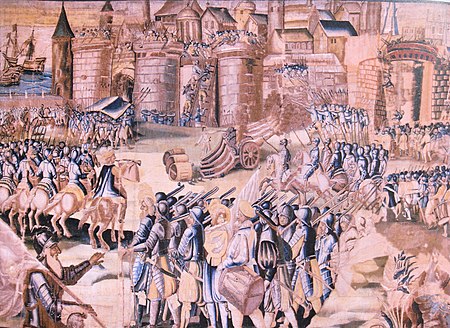Siege of La Rochelle (1572–1573)

The siege of La Rochelle of 1572–1573 was a massive military assault on the Huguenot city of La Rochelle by Catholic troops during the fourth phase of the French Wars of Religion, following the August 1572 St. Bartholomew's Day massacre. The conflict began in November 1572 when inhabitants of the city refused to receive Armand de Gontaut, baron de Biron, as royal governor. Beginning on 11 February 1573, the siege was led by the Duke of Anjou (the future Henry III). Political considerations following the duke's election to the throne of Poland in May 1573 resulted in negotiations, culminating on 24 June 1573, that lifted the siege on 6 July 1573. The Edict of Boulogne signed shortly thereafter brought an end to this phase of the civil war. The siege of La Rochelle was contemporaneous with Catholic assaults on the cities of Sommières (led by Henri I de Montmorency) and Sancerre.
Excerpt from the Wikipedia article Siege of La Rochelle (1572–1573) (License: CC BY-SA 3.0, Authors, Images).Siege of La Rochelle (1572–1573)
Place de la Caille, La Rochelle
Geographical coordinates (GPS) Address Nearby Places Show on map
Geographical coordinates (GPS)
| Latitude | Longitude |
|---|---|
| N 46.1591 ° | E -1.1517 ° |
Address
Place de la Caille
Place de la Caille
17000 La Rochelle
Nouvelle-Aquitaine, France
Open on Google Maps









